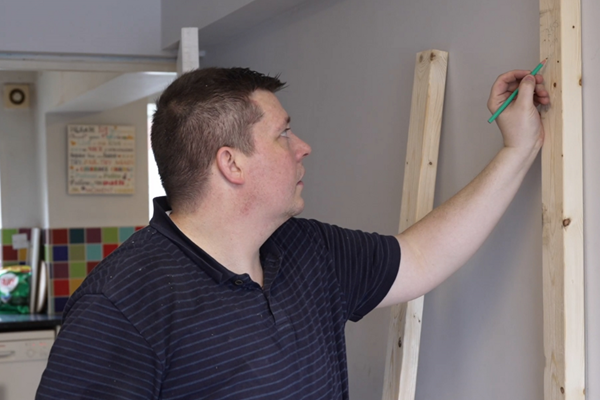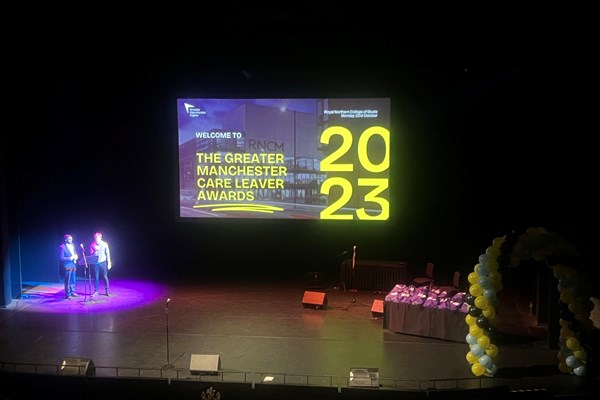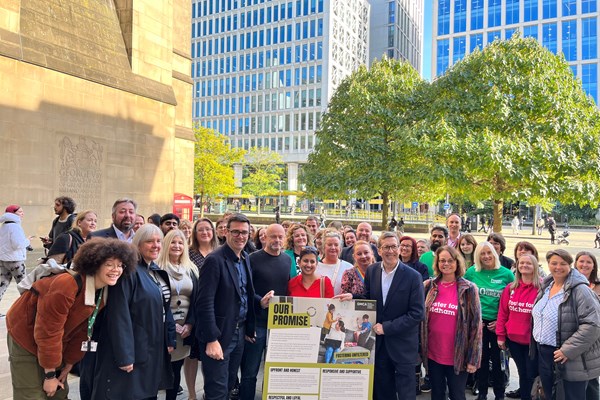
Greater Manchester closes the educational equality gap for disadvantaged children
Children from the most deprived communities in Greater Manchester are getting a better start in life, thanks to pioneering work to reform early years services across the city-region.
New figures, released by the Department for Education, shows that Greater Manchester has now closed the educational equality gap between local young children eligible for free school meals and the rest of the country.
This means that 56% of children from disadvantaged backgrounds are starting school ready to learn, an increase of four percent since 2015/16 – the equivalent of 250 children. There is a strong relationship between deprivation and school readiness levels, which is why these results are particularly positive, given the higher levels of deprivation in Greater Manchester.
These latest figures highlight Greater Manchester’s determination to close the educational equality gap for all children, with an ambition to increase the number of children starting school ready to learn to above the national average in the next two years.
The progress of Greater Manchester’s school readiness programme was unveiled at an event showcasing the innovative work to improve speech, language and communications across the city-region.
Funded through the Department for Education, the Pathways to Talking programme is working with the ten local authorities, clinical commissioning groups, NHS providers , primary schools, early years providers and voluntary sector organisations.
The £1.5m programme is supporting a range of initiatives across Greater Manchester including:
- In Wigan, parent champions are being developed to deliver training and support to other parents in relation to developing their child’s speech and language.
- In Manchester, work with schools will help to identify children who will benefit from additional support in their reception year to develop their language skills
- Work is taking place in Bury to explore the role of the library service in helping children develop their language skills.
Speaking at the event at the AJ Bell Stadium in Salford, on Monday 2 December, Mayor of Greater Manchester Andy Burnham said: “Greater Manchester continues to lead the way in tackling the issue of school readiness, working together innovatively and doing things differently to make sure no child is left behind.
“The positive impact of this work on families and children across Greater Manchester cannot be underestimated. That we have now closed the gap between children from our most disadvantaged communities and the rest of the country is testament to the pioneering reforms of our early years provision here in Greater Manchester. I’m confident that we are heading in the right direction, and I hope it spurs everyone to go further and faster.
“Speech, language and communication is a particular focus of our school readiness work, because we know that if the first three years of a child’s life aren’t filled with sound and language, they will struggle to thrive in later life. However, we also know that with the right support, children can catch up and through the Pathways to Talking programme we are making significant strides.”
Attendees also heard from parents involved in developing the BBC’s Tiny Happy People initiative – a free digital resource for parents and professionals working with pre-schoolers in Greater Manchester. The resources have been designed to help develop young children’s language and communication skills in a bid to close the pre-school language and communication gap.
Data released on Thursday 28 November, shows that Greater Manchester has closed the GLD gap with the England average for children eligible for free school meals. The good level of development (GLD) average for this cohort has increased from 55% for the academic year 17/18 to 56% for 18/19.
This follows the release of headline Early Years Foundation Stage data statistics in October, which shows that 68.2 % of children in Greater Manchester achieved a Good Level of Development (GLD) in 2018/19 compared to the national average – an increase from 68% the previous year.
The assessment of school-readiness is made using the ‘good level of development’ indicator that assesses a child’s personal, social and emotional development, physical development, communication skills and language. (The GLD measure includes achievement of the Early Learning Goals for Communication and Language, physical development, PSE, Literacy and Mathematics).
Notes to editors:
GM Pathways to Talking
In early 2019, Greater Manchester was successful in securing £1.5m funding from the Department for Education Early Outcomes Fund to support spread and scale of the Greater Manchester early years speech, language and communication pathway.
With most areas implementing the pathway since 2014, the focus for the Greater Manchester bid was to evaluate the impact of implementation across all ten areas and to identify and understand some of the enablers and barriers to improving speech and language outcomes. The project included a locality stocktake undertaken with multiagency partners to identify strengths and gaps in delivery and learn more about the outstanding practice in place across Greater Manchester.
DfE Early Outcomes Fund
The overall aim of the EOF fund is to support Local Authorities to improve local services in order to secure good early language outcomes for children and reduce the word gap for the most disadvantaged children. The fund supports the government’s social mobility strategy announced in 2017 Unlocking Talent, Fulfilling Potential: a plan for improving social mobility through education.
It aims to:
- to increase leadership focus at local authority level on the key issue of early language
- to enable local authorities to undertake work to improve their services and how they are delivered
- to resource evaluation and partnership working amongst local authorities that will spread innovations around the wider system
GMPTT was one of 8 projects funded nationally, receiving the largest award of £1.5m.
Article Published: 02/12/2019 16:34 PM



